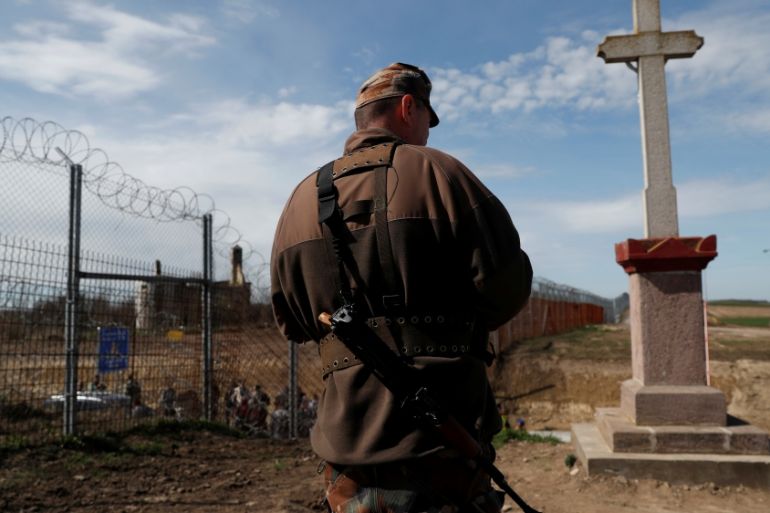Hungary ‘starving’ Iraqi migrants detained at border
The Iraqis’ asylum claims were rejected by Hungary and they were denied food while being held in the transit zone.

Hungary has refused to provide food for four to seven days for asylum seekers whose applications have been rejected, prompting the European Court of Human Rights (ECHR) to intervene, a Budapest-based rights group told Al Jazeera on Thursday.
Andras Lederer, the information and advocacy officer at the Hungarian Helsinki Committee (HHC), explained that parents from two Iraqi families were denied food while detained in Hungary’s two transit zones in February.
Keep reading
list of 4 itemsUN report charts lethal cost of migration over past decade
Conflict, climate, corruption drive Southeast Asia people trafficking: UN
Bodies of three Rohingya found as Indonesia ends rescue for capsized boat
HHC is a human rights organisation that is the only group in Hungary to provide high-level legal advice to refugees for free.
Most recently, two Iraqis were denied food for over four days, up to February 19, Lederer said. The family’s asylum claim was rejected, but their deportation to Iraq has been suspended.
Earlier in February, two other Iraqis were denied food for six-and-a-half days, up to February 14.
Though the parents of the two families were not fed, Lederer said, the HHC was “very happy” their children received food, but it “shows that theoretically it’s possible to provide food to these people”.
The ECHR issued emergency orders, forcing Hungary to provide food to the Iraqis under Rule 39 (PDF), an interim measure which only applies “where there is an imminent risk of irreparable harm”.
The ruling will be in place as long as they are detained in Hungary’s transit zones.
‘Alien policing’
|
|
The Hungarian government, headed by the far-right Fidesz party, has long campaigned against migration, which they view as a threat to “Christian” Europe.
Hungarian Prime Minister Viktor Orban said immigration leads to the “virus of terrorism” when he launched his campaign earlier this month for European Parliament elections to be held in May.
Orban has faced increasing criticism over his government’s alleged restrictions on academic freedom, media plurality and its stance on refugees.
Fidesz links immigration to Hungarian-American billionaire George Soros.
Soros has been the target of Hungarian government campaigns that attempt to link him with ‘pro-immigration’ forces in the EU. Some have called these campaigns anti-Semitic.
Last year, the government amended the country’s Asylum Act and Fundamental Law which allowed for the detention of rejected asylum seekers in two “transit zones” on the border with Serbia.
These people are held under an “alien policing procedure” creating de facto detention in the transit zones.
Lederer explained that a government decree from 2007 establishes physical and legal standards for the alien policing procedure.
However, “there no clear regulation about food provision inside of transit zones in the decree”, he said. “Regarding all other potential sites where this alien policing procedure can be conducted, there are very detailed and clear regulations.”
Another starvation in the transit zones, another #rule39 emergency order issued by the European Court of Human Rights to #Hungary.
Parents of 6 children did not receive food since last Friday. Family's asylum application was rejected, their deportation to Iraq is suspended. pic.twitter.com/EDwG9qy8cM
— HunHelsinkiCommittee (@hhc_helsinki) February 19, 2019
It’s not the first time Hungary has denied asylum seekers food. Two Afghan families and a pair of Syrian brothers were among those denied food by Hungarian authorities in August 2018.
The ECHR also issued interim measures in these cases.
“This disregard for people’s wellbeing smacks of a cynical move to force people to give up their asylum claims and leave Hungary,” Lydia Gall, the Eastern EU and Balkans researcher at Human Rights Watch, said at the time.
When asked for comment on the cases, a Hungarian government spokesperson told Al Jazeera the ECHR criticism was “not unexpected; the organisations, institutions and politicians in the pay of George Soros have been criticising Hungary (and many other right-wing governments in Europe with an anti-immigration agenda) for a long time for its stance on illegal migration.”
The government has not commented specifically on the cases.
Lederer said the issue will likely continue unless the government decree is changed to include regulations for the transit zones.
“It’s not an act of parliament,” which would make changing the measure more difficult, he said. “It just needs to be amended.”